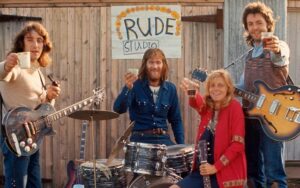 SYNOPSIS: “Paul McCartney: Man on the Run,” a feature length documentary now streaming on Prime Video, covers the years 1970 to 1981 as the former Beatle reinvented himself for a new era.
SYNOPSIS: “Paul McCartney: Man on the Run,” a feature length documentary now streaming on Prime Video, covers the years 1970 to 1981 as the former Beatle reinvented himself for a new era.
CAST: Paul McCartney, Ringo Starr (archival footage), John Lennon (archival footage), George Harrison (archival footage), Linda McCartney (archival footage), Wings (archival footage). Directed by Morgan Neville.
REVIEW: For music fans of a certain vintage, 2026 is already a gold star year. “EPiC: Elvis Presley in Concert” strips the kitsch away from the King of Rock ‘n’ Roll’s Vegas years in exhilarating fashion and now comes “Paul McCartney: Man on the Run” an up-close-and-personal look at a rarely documented and often misunderstood chapter in the career of the former Beatle.
By the time 1970 rolled around Paul McCartney had spent most of his life playing with John, George and Ringo. With the eyes of the world on him, the twenty-seven-year-old, one of the most famous people on the planet, had to shoulder the perception that he broke up the band, and find a way to move forward personally and professionally.
Millions of gallons of ink have been spilled documenting the legendary band, there have been movies and even a West End play, but relatively little time has been afforded the beginnings of McCartney’s transition from The Beatles to Wings and beyond.
As the title suggests, “Man on the Run” paints a portrait of McCartney, a restless musician in motion, searching for a new creative outlet. It’s here that director Morgan Neville digs deep, capturing the pressure that threatened to crush McCartney’s creativity as animosity regarding the Beates’ demise swirled around him, exacerbated by an ongoing business dispute with ruthless manager Allen Klein, whose dealings further estranged McCartney from Lennon.
As Lennon marshalled the counterculture in New York, McCartney, wife Linda and kids, decamped to a farm in remote Scotland, where he hid from the world, releasing albums like “Ram” that failed to satisfy fans and critics. (Although it should be said, those records have been critically reassessed in the years since then.)
Worried he wouldn’t be able to top his Beatles era work and trading musical jabs with Lennon, McCartney put together Wings, longing for the excitement of being in a band.
The altruistic blending friends and family fed McCartney’s need to feel part of a group, but, as the doc makes clear, several members complained of feeling like underpaid hired hands. McCartney, who is an executive producer on the film and is quoted throughout, responds by saying he wasn’t in charge of the accounts and didn’t realize his bandmates didn’t share his enthusiasm.
It’s a rare disingenuous moment. McCartney may well have been oblivious to the power dynamic within Wings, but his response comes across as a cop out. It’s one of the few moments that feels like a missed opportunity to shed a bright light on the band’s inner workings.
Also strange is the absence of “Give Ireland Back to the Irish” and “Hi Hi Hi,” two controversial singles banned for their political and sexual lyrics.
Still, the doc is a treasure trove of never-before-seen footage (with some cool added animation effects), musical performances and insight from McCartney and those close to him that paints a picture of a vulnerable risk taker, an artist who spent the 70s outrunning his previous work. In the film’s final moments, the musician sums up his Wings journey succinctly. “We made what seemed like an impossible dream come true.”